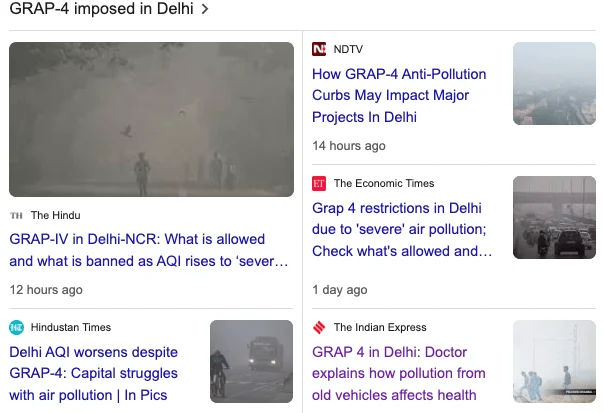Dr. Vikas Mittal, a pulmonologist at CK Birla Hospital in Delhi, describes how GRAP 4 and other emergency treatments might lessen the negative consequences of pollution.
Moreover, authorities were compelled to enact the strictest anti-pollution measures under Stage 4 of the Graded Response Action Plan (GRAP) after the air quality in Delhi-NCR fell to a “severe plus” level on Sunday night.
GRAP-4 Limitations
Several limitations have been put in place to lessen the health dangers that the hazardous air poses:
- School Closures: All schools have been instructed to switch to online instruction, with the exception of classes 10 and 12.
- Vehicle Restrictions: Medium and large diesel-powered cars that are not necessary are not allowed to enter Delhi. With few exclusions, construction and demolition operations have also been suspended.
- Work-from-Home: A 50% work-from-home policy has been recommended for NCR offices.
These steps are intended to reduce pollution and enhance the quality of the air in the area. In addition to those that were already implemented during earlier GRAP phases that prohibited BS-IV or older diesel vehicles.
Potential Consequences of Spending Years preparing for UPSC
There are still major health concerns associated with air pollution, especially in cities. According to Dr. Vikas Mittal, a pulmonologist at CK Birla Hospital in Delhi, emergency measures like GRAP 4 can lessen the negative impacts of pollution, but ageing cars—particularly diesel ones—make the issue worse by emitting dangerous emissions. Improving air quality and safeguarding public health require an understanding of these issues.
Dr. Mittal claims that these prohibitions have the following positive health effects:
- Respiratory Relief: GRAP 4 reduces exposure to airborne pollutants, hence preventing exacerbations of asthma and other acute respiratory disorders.
- Cardiovascular Protection: Lower particle matter lowers the risk of stroke and heart disease.
- Emphasis on Vulnerable Groups: The cleaner air has a major positive impact on children, the elderly, and people with underlying medical conditions.
The Credit Card Trap – How to Avoid it?
Health Risks from Pollution by Ageing Vehicles
According to Dr. Mittal, pollution from outdated cars, especially those that run on diesel, seriously deteriorates air quality and puts public health at risk:
- Negative Emissions: Increased emissions of carbon monoxide (CO), nitrogen oxides (NOx), and particulate matter (PM) from ageing automobiles are associated with cardiovascular and respiratory disorders.
- Penetration of the Deep Lung: Exhaust-derived fine particulate matter penetrates deeply into the lungs, increasing the risk of cancer and creating long-term respiratory disorders.
- Exposure to VOCs: Children and those with preexisting medical conditions are among the susceptible groups. They are harmed by volatile organic compounds (VOCs) from outdated automobiles.
The True Meaning of 1 Billion: Why Health Is the Ultimate Wealth
The element of diesel
According to Dr. Mittal, older diesel cars present even bigger risks because of their ageing engine parts and antiquated emission systems. Important issues include:
- Increased Soot and Nitrogen Oxides: Diesel engines release soot and NOx, which aggravate pulmonary conditions and fuel climate change.
- Effects on Cancer: Diesel exhaust is known to cause cancer, increasing the risk of heart disease and lung cancer.
- Over Time, inefficiency: As diesel engines age, incomplete combustion leads to worsening emissions.
Respect GRAP 4 regulations and back laws encouraging cleaner cars and less diesel use to enhance air quality.
Also Read: How to Identify Fake Cooking Oil?

Shubhangi Gupta is a distinguished content writer and the visionary founder of The Unpleasant – Acha Nahi Sabse Sacha. With a Master’s degree in Commerce from University of Lucknow, Shubhangi has seamlessly blended her academic background with her passion for reading and writing, embarking on a successful career as a content writer since 2019.





